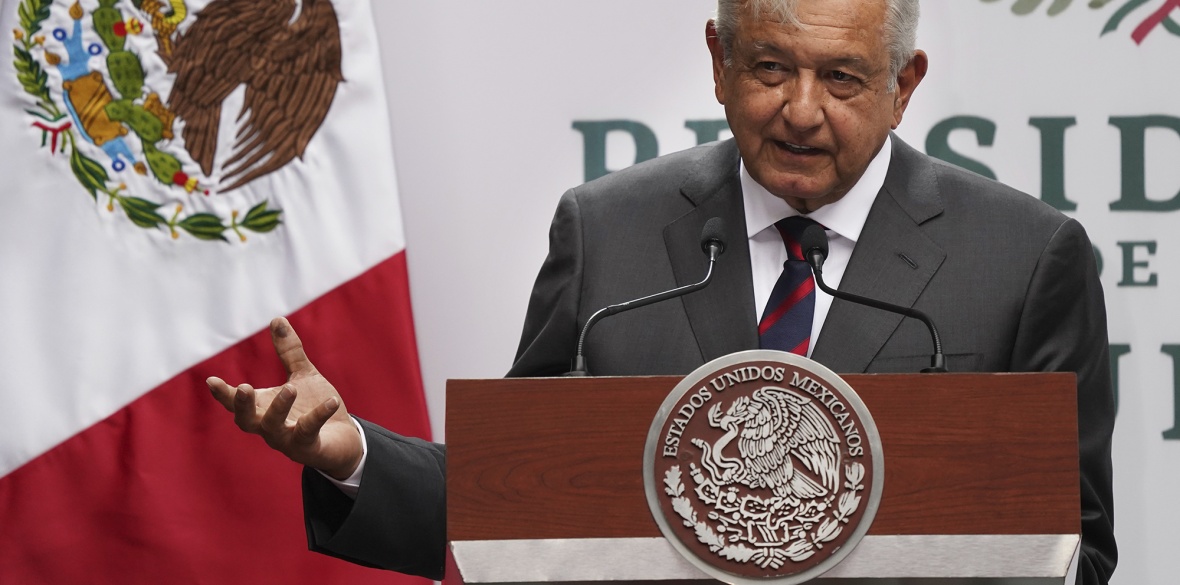This is the last article you can read this month
You can read more article this month
You can read more articles this month
Sorry your limit is up for this month
Reset on:
Please help support the Morning Star by subscribing here
ON APRIL 10 Mexicans voted in a recall referendum on President Andres Manuel Lopez Obrador (Amlo) just over half way through his six-year term.
The result was a smashing victory for the president: of 17 million who voted, 15.6 million — around 91 per cent — voted for him to remain in office.
This was more or less what was expected, because the opposition, knowing it would lose, had campaigned against holding the referendum and when they couldn’t prevent it, called on people not to vote.
The bizarre spectacle of opposition activists with posters saying “Finish [your term] and leave” — which is exactly what Amlo always intended to do — is ludicrous, but also shows their exasperation.
For over a year now Amlo has been insisting on the importance of the recall vote as an instrument of participatory democracy. It never existed before, and he managed with difficulty to get it through Congress as a constitutional amendment.
The opposition used its control of the corrupt Electoral Institute (INE) and Tribunal (TEPJF) to postpone the vote or find legal pretexts to avoid it, and when it became clear they couldn’t prevent it, they used INE to avoid publicising it and to limit the number of polling stations (voter suppression).
But they reckoned without the Mexican people. At first there was widespread indifference to the issue — why press for a recall vote on a president you support? — but finally people responded to Amlo’s insistence on the importance of establishing the principle of recall as a democratic right.
The result was that in recent months the recall vote became a mass campaign, with many thousands on social media and in street demonstrations calling for the referendum to take place and for a massive vote for Amlo to continue.
As in last year’s mid-term congressional and gubernatorial elections, INE has systematically abused its powers to limit debate.
Like many countries, Mexico has regulations to prevent use of public funds in election campaigns or campaigning by civil servants. But INE has used these rules to prevent the president and his cabinet members from campaigning for their own policies.
On the recall referendum, INE has repeatedly ordered government ministers and Morena party politicians not to advocate a vote for Amlo to continue in office, indeed not even to make impartial appeals for voters to participate: an electoral office discouraging voting…
So farcical has the situation become that many politicians have now openly defied INE’s diktats, and a showdown is also coming on reform of the electoral administration.
On April 5 Amlo’s home secretary, visiting Sonora State with its Morena governor, made a bold statement calling for people to vote for the president to continue; questioned by the media on whether he had broken the law, he said not at all.
Then in Mexico City Governor Claudia Sheinbaum convened a mass rally on April 6 to promote Amlo’s proposal for electricity reform, to re-establish majority public ownership and control of electric power generation and distribution (reversing neoliberal privatisation).
A huge turnout showed that popular support for Amlo and his transformation is building fast.
“Yes to the Electric Reform!” was Sheinbaum’s key slogan, but she also spoke about the recall vote: “To some INE councillors, we say they have no moral authority. Deep down they hate popular participation…Long live participatory democracy!…Long live our free, democratic, sovereign people!”
To understand the results it is necessary to look more closely at INE’s anti-democratic antics. It only installed about 30 per cent of the polling stations that had existed for the last general election in 2018, and many were installed in out-of-the-way places to make it difficult for people to vote: there were many complaints from electors unable to find their polling station.
Those polling stations that existed saw long queues, with many complaints about difficulty of access. Photos on social media show people in Quintana Roo State (the Cancun tourist area) protesting outside a locked polling station, hundreds of villagers from an indigenous community in a remote area of Hidalgo State trekking kilometres to reach their polling station, and (tragically) villagers from a community in Chiapas killed in a road accident while trying to get to their polling station.
In the circumstances the 15.6 million votes for Amlo are a real triumph; in a fairly conducted election with sufficient polling stations in accessible locations, he would have obtained three times as many votes. The battle for real democracy in Mexico continues.
Amlo has faced dirty tricks throughout his career, as in 2005 when as governor of Mexico City he was ousted by legal machinations, and in 2006 when he was denied victory in the presidential election by blatant fraud.
He has always prevailed in the long run by sheer determination and faith in the people, and once again, the people have shown their faith in him. This huge vote of confidence may well signal a key turning-point in Mexico’s 4T Transformation.
Just how much of a turning-point may well become clear in the next few days, when the Mexican Congress will at long last, beginning on April 12, debate and vote on Amlo’s proposal for electricity reform.
A further crucial issue linked to the electric reform is public ownership of lithium deposits (Mexico has huge reserves in Sonora) which Amlo wants to declare the exclusive domain of the nation.
Popular support for sovereignty in these areas is enormous, but so are the interests opposing national control.
David Raby is a retired academic and independent researcher on Latin America. He can be reached at [email protected] and on Twitter @DLRaby.









